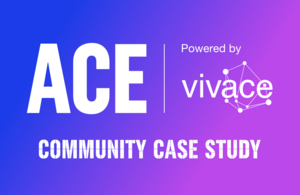The opportunity of a lifetime: the Bays Consulting supplier story
Curiosity kept Bays Consulting pondering after delivering a commission for ACE – and the subsequent results changed the company’s prospects.

Bays Consulting, an analytics company that prides itself on using ‘maths, not magic’ to solve data challenges, supported the Accelerated Capability Environment (ACE) on a government commission to model the way large crowds behave in an emergency.
However, after the initial commission work was complete, the Bays team felt more could be done to develop the concept – and two of them asked founder Sophie Carr for permission to spend time taking it further. The original work was covered by Crown copyright, which meant it couldn’t be reused, so they started from scratch.
A novel solution
At this time, Bays was investing internally to explore what was possible simply to satisfy the team’s curiosity, with no suggestion of external funding. But when a follow-up piece of work for the same customer was put out to tender to ACE’s expert Vivace community, Bays had an interesting solution to offer.
Dr Carr explained: “We said, we can use your code and work on it – but what you’re investing won’t get you to where we are now, because of what we’ve done ourselves. So now the money for this work is accelerating our roadmap and giving them a much, much better tool at the end of it – and it’s genuinely a partnership.”
This second phase delivered a simulation tool of interest to event operators, responders, and policymakers, which has provided an increased understanding of how crowds could move in response to external stimuli.
As part of the deal, Bays kept the intellectual property (IP) for their new tool, meaning they could commercialise it, but the Home Office was given a free forever licence for use within the Home Office.
Bays’ new tool, says Dr Carr, “is a 2D cellular model which is faster and more efficient to use than its ancestor. Maps of a given area can be uploaded, and crowd composition differentiation means groups, individuals and families are all easily identified.
“This is important because realistic modelling against different scenarios is key to increasing understanding of what mitigations and protections are needed to help keep the public safe.
“The crowd can be set by age, to mimic known footfall or density in a given area on a given day. It’s also scalable – and can be used for anything from a local cinema or high street to a major street in London.”
“This model is really designed to be a risk management and crowd management tool. It can help planners to understand how their current plan could affect the outcomes of a scenario.”
Dr Carr added: “The crowd’s objective is to not get injured. So, we’ve been working with a professor of psychology to make sure we capture the crowd’s responses as accurately as possible.”
Validators working with Bays as part of this latest ACE work include an ex-head of crowd control and an ex-deputy commissioner from London’s Metropolitan Police.
The opportunity of a lifetime
In terms of company development, Dr Carr said, having the IP “gives us something we can push out as a product or service, something which helps us create a stable base and be known for something we’re good at”.
“I’m not joking when I say it’s the opportunity of a lifetime – it’s literally company-changing.”
Dr Carr founded Bays in 2009 after she was made redundant. Winning a grant in 2021 to predict the need for independent food banks in the UK enabled her to hire the company’s first statistician. Work for the Joint Biosecurity Centre (JBC) during the pandemic followed, because they needed statisticians too, and the company started to take off. Then Bays found ACE – and a whole new journey began.
Looking back over her experience with ACE so far, Dr Carr said: “The real draw, as a small company, is that ACE offers – in a way that no other government framework we’re involved in has – the chance to work on short, sharp, quick turnaround projects and different projects.
“Equally, the rainbow teaming means we’ve worked with much bigger companies who we would struggle to meet and work with otherwise.
“We’ve now met other companies that we bid on work with outside ACE, and we’ve built up a reputation externally for some of the work we’ve done internally. I don’t know any other environment that is a genuine community in the way that ACE is.”